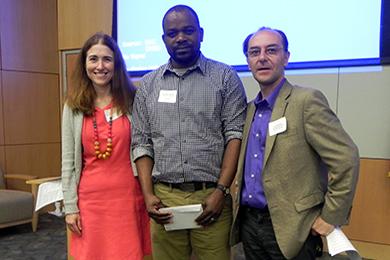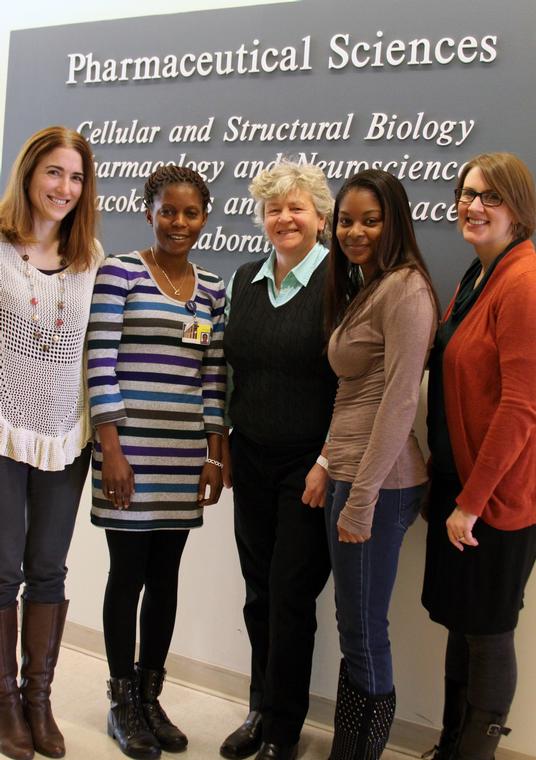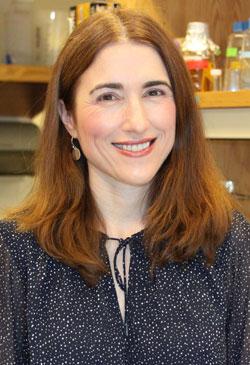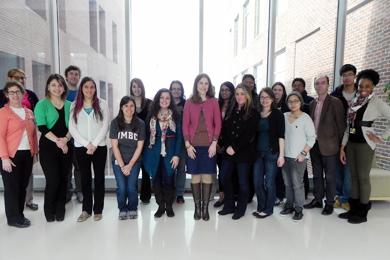Conference at SOP Brings Together Researchers from Biology and Chemistry
Current and future scientists from across the mid-Atlantic region gather at the School of Pharmacy for the seventh annual Frontiers at the Chemistry-Biology Interface Symposium.

By Malissa Carroll
May 14, 2014
The University of Maryland School of Pharmacy welcomed more than 200 faculty, students, and government and industry professionals from across the mid-Atlantic region to the seventh annual Frontiers at the Chemistry-Biology Interface Symposium (FCBIS) on May 10. Organized by Sarah Michel, PhD, associate professor in the Department of Pharmaceutical Sciences (PSC) and director of the PSC PhD Program, the symposium was designed to highlight regional research at the interface of chemistry and biology and offer undergraduate and graduate students, postdoctoral fellows, and early career professionals the opportunity to meet and exchange ideas with tenured researchers from academia, government, and industry.
“Faculty in PSC are committed to bringing interprofessional events such as the Frontiers at the Chemistry-Biology Interface Symposium to our students. FCBIS gave our PhD students opportunities to interact with and learn from students and professionals in other programs and to establish lasting relationships that will lead to future scientific collaborations,” says Andrew Coop, PhD, professor and chair of PSC. “I applaud Dr. Michel for her hard work in hosting this year’s event. She organized insightful lectures and informative panel presentations that ensured that all of our attendees gained new knowledge from their participation.”
Established through a joint venture among six founding schools – including the University of Pennsylvania; University of Delaware; Johns Hopkins University; Johns Hopkins University School of Medicine; University of Maryland, College Park; and University of Maryland, Baltimore County (UMBC) – FCBIS represents the broad spectrum of sciences and offers an intimate environment to foster scientific discussion at all levels.
The School of Pharmacy entered the venture this year as its seventh member.
“As one of the founding members of this organization, I would like to thank Dr. Michel, as well as the Department of Pharmaceutical Sciences at the School of Pharmacy, for all of the hard work and effort they put into hosting this year’s conference,” said Steven Rokita, PhD, professor of chemistry at Johns Hopkins University. “They have done a great job. This has been a really remarkable event.”
The symposium included seven lectures delivered by internationally renowned faculty members from the symposium’s six founding schools; in addition to a presentation by Maureen Kane, PhD, assistant professor in PSC. It also featured two poster sessions that focused on the latest in cutting-edge research in the mid-Atlantic region.
“This symposium is a great event for all undergraduate and graduate students in the sciences to attend,” said Maryanna Lanning, a graduate student in the PSC PhD Program. “It not only sheds light on the research being conducted across the different schools in our area, but also offers us an opportunity to interact and network with each other.”
Included as part of the symposium’s poster sessions was a student poster competition, for which a prize of $250, which was sponsored by the American Chemical Society’s journal ACS Chemical Biology, was awarded to Serge Ongagna, a graduate student from the University of Delaware. Ongagna’s poster highlighted his research examining how transporters found in Vibrio parahaemolyticus – a saltwater bacterium that, when ingested, causes gastrointestinal illness in humans – affect osmotic stress within the organism. “Attending this symposium has been a wonderful experience. I’m honored to have been chosen as the winner of this year’s poster competition,” said Ongagna.
The event also included a panel presentation with professionals from leading pharmaceutical companies, such as GlaxoSmithKline, MedImmune, and BD Biosciences, and researchers from the National Institute of Standards and Technology and the US Army Medical Research Institute of Chemical Defense, speaking about the wide range of careers available to individuals with graduate degrees in biology, chemistry, and the pharmaceutical sciences.
“The goal of FCBIS is to bring together faculty, students, and industry professionals from across the mid-Atlantic region to advance scientific knowledge in the fields of chemistry and biology,” says Michel. “It is my hope that all who attended this year’s symposium were able to learn about and contribute to the most recent advances in their fields and meet others with whom they could collaborate on future projects.”
The eight annual Frontiers at the Chemistry-Biology Interface Symposium will be held at UMBC in Spring 2015. Individuals are encouraged to contact James Fishbein, PhD, professor of chemistry and biochemistry at UMBC, for more information.



